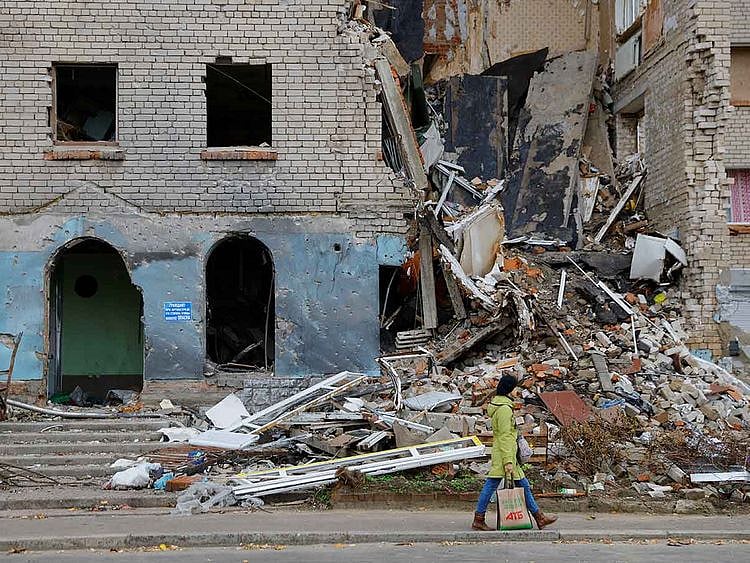Ukraine water, power cuts after ‘massive’ Russian missile attack
Several blasts shook the capital Kyiv, days after drone attacks on Russian Crimea fleet

Kyiv: Ukraine suffered sweeping blackouts and water supplies were cut for 80% of Kyiv residents on Monday after what Ukrainian officials called another “massive” Russian missile attack on energy facilities.
“More than 50” cruise missiles were launched at targets across the country early on Monday, the Ukrainian army said on Telegram.
“From 7:00 am (0500 GMT) on October 31, Russia carried out several waves of missile attacks against critical infrastructure in Ukraine,” the army said, adding that “44 missiles” had been shot down.
Several blasts shook the capital Kyiv, days after Russia blamed Ukraine for drone attacks on its Crimea fleet in the Black Sea.
“Currently, due to the emergency situation in Kyiv, 80% of consumers remain without water supply,” the city’s mayor Vitali Klitschko said on Telegram.
“Engineers are also working to restore power to 350,000 homes in Kyiv that were left without electricity,” he added.
At least five explosions were heard in the city between 8:00 am and 8:20 am local time, according to AFP journalists.
Prime Minister Denys Shmyhal said there were power cuts in “hundreds” of urban settlements across seven Ukrainian regions.
‘Cold winter ahead’
Near one of the sites targeted north of Kyiv, a soldier told AFP that three missiles had struck.
“It is dangerous here because there could be more strikes,” the soldier said at a blocked crossroads.
In a nearby town, Mila Ryabova, 39, told AFP she was woken by between eight and 10 “powerful explosions”.
“We were together with my family, preparing my daughter for school, but now there is no electricity in our house and at school,” said Ryabova, a translator.
“I’m not afraid of anything. (Some people) are still in shelters now, but not us.
“But we are worrying and talking about opportunities to move abroad, because there is a cold winter ahead. We may not have electricity, heat supply. It can be hard to handle, especially with a small child.”
Grain deal
Monday’s attack comes after Russia pulled out of a landmark agreement that allowed vital grain shipments via a maritime safety corridor.
The July deal to unlock grain exports signed between Russia and Ukraine - and brokered by Turkey and the United Nations - is critical to easing the global food crisis caused by the conflict.
But Russia announced Saturday it would pull out of the deal after accusing Kyiv of a “massive” drone attack on its Black Sea fleet, which Ukraine labelled a “false pretext”.
Sevastopol in Moscow-annexed Crimea has been targeted several times in recent months and serves as the fleet’s headquarters and a logistical hub for operations in Ukraine.
Despite Russia’s decision to exit the deal, two cargo ships loaded with grain and other agricultural products left Ukrainian ports on Monday, according to a marine traffic website.
Twelve ships were due to leave Ukraine on Monday and four were to head to the country, per the Joint Coordination Centre that has been overseeing the agreement.
“Civilian cargo ships can never be a military target or held hostage. The food must flow,” Amir Abdulla, UN Coordinator for the Black Sea Grain Initiative, said on Twitter.
Sign up for the Daily Briefing
Get the latest news and updates straight to your inbox
Network Links
GN StoreDownload our app
© Al Nisr Publishing LLC 2026. All rights reserved.